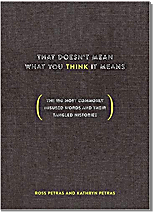
The 150 Most Commonly Misused Words and Their Tangled Histories

| Book of the Month | ||
 |
That Doesn't Mean What You Think It Means: The 150 Most Commonly Misused Words and Their Tangled Histories |
 |
Publisher: Ten speed Press
Authors: Kathyrn & Ross Petras
$14.99 (or $10.52 on amazon.com)
ISBN 978 039 958 1274
The Petras pair are perhaps most famous for their best-selling calendar which every day offered up another of the '365 Stupidest Things Ever Said'. It should be no surprise therefore that when this couple turned their attention to misused worlds in the English lexicon they found a splendid selection of words which even respectable journalists get wrong. For example many journalists are perhaps more accurate than they realize when they offer a small bit of information as a 'factoid'. The problem is that 'factoids' are things that look like facts but are not. Perhaps because not every misused word is in place of another correct word, the authors avoid using 'malapropism', for such mistakes, though this little book is largely a list of common malapropisms. Below you will find a few examples to whet your appetite. (That's 'whet' meaning 'sharpen', not 'wet' as some writers mistakenly assume. Damp appetites don't make you hungry.)
The book is as advertised on the plain brown cover. It is about 150 misused words. It starts with a quick introduction and then gets down to listing the words over the next 195 pages. There are rare examples (on green pages) which occasionally explain grammar, as words like 'I' and 'whom' also get often misused. (For example, 'He told Fred and I about the problem' is wrong. Remove Fred and you can see how wrong it is. No-one says 'He told I about the problem.')
Each misused word starts with an example of that word being misused. Often these are taken from newspaper or magazine articles. There follows a clear, well-written and sometimes amusing explanation of why this misuse is wrong. It also sometimes explains how the misuse arose, and finishes with an example of correct usage. Regrettably there are no cartoons which would illustrate the wrong usages rather well. In fact this book has no pictures. There are definitely times when this reviewer found the book educational. It was revealing, for example to discover that 'epicentre' does not mean 'precisely in the middle, but 'above the centre'. So the epicentre of an earthquake is that bit of the Earth's surface above where the underground event took place. We also get a bit of history, explaining why for example 'flammable' and 'inflammable' mean the same thing. (Because the 'in' prefix is like the 'in' of 'input' not the 'in' of 'inexcusable'.)
Who is this book for? Well, if you use English for a living, then nothing destroys your reputation as quickly as the public misuse of a word. As the authors remark in their introduction, if your misuse is silly enough everyone focusses on that and what you were actually trying to say gets lost in the mockery. Also if you are preparing for a job interview, or writing an important report, it would be a good idea to have this book handy to check that you are using a word correctly. For the rest of us this is a fun book to dip into for educational details. When a rock is floating in space it is a meteoroid, as it comes down to earth it is a meteor, and when it is on the ground it is a meteorite. Did you know that?
Verdict: Not necessary (until it is really necessary), but fun to read.
Assessment 9/10